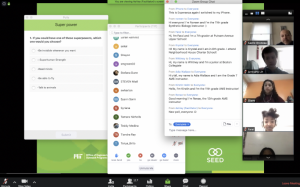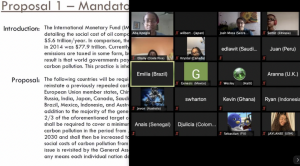SEED Academy students were about to attend the 4th session of their Spring 2020 semester when in-person gatherings were cancelled due to Covid-19. With half of the semester to go, instructors and staff quickly organized to take the program online. Students were surveyed to assess their access to technology, and class materials were adapted to fill three virtual enrichment sessions with both STEM content, and soft skills that would help students cope and adapt to the new virtual learning reality.

In their virtual sessions, the SEED 7th grade Engineering Design class embarked in an exploration through Biomedical and Mechanical Engineering. After reviewing the anatomy and physiology of the human heart, they discussed medical device design considerations including mechanical properties, invasiveness, approval process and biocompatibility. In a different session, they learned about electrical components and circuit basics, and got a glimpse into wiring circuits, power sources, resistors, switches and temperature probes. This grade’s Academic Mentoring Seminar (AMS) focused on attention and memory, and skills for executive functioning, including time management, and emotional regulation. Students learned about the risks of multitasking, and how to assess their home workspace.
The SEED 8th grade Environmental Engineering class explored renewable energy, climate change and environmental disaster response online. In lieu of a final project, this class closed the semester with a Paris Climate Agreement meeting simulation, where they debated a world-wide mandatory carbon tax. Students represented 17 different countries, including Haiti, Brazil, Japan, United Kingdom, Senegal, Indonesia, Australia, Canada, Saudi Arabia and the United States, and offered arguments in favor and against the tax.

In all grades, SEED AMS content was adapted to include students’ new needs stemmed from the Covid-19 reality. SEED 9th grade students, for example, learned how to plan an effective daily schedule to manage workloads, how to identify stress, and how to creatively solve problems during the pandemic. They discussed assertive communication skills and basics of public speaking, how to offer constructive feedback and the importance of having a growth mindset. As part of their virtual curricula, they learned how to construct an “elevator pitch.”
The SEED 10th grade Robotics class used their virtual sessions to debate the use of artificial intelligence in areas like social media, college admissions and hiring, and explored engineering roles, and robotics simulations. They closed the semester with a robot design challenge. During their AMS sessions, students started thinking about college applications, and learned how to write better essays and personal statements.
Students in the SEED 11th grade Biological Engineering class focused on Synthetic Biology. Their discussions included DNA assembly techniques, sequencing technology, genetic editing and CRISPR. Students participated in a virtual lab, and engaged in debates about ethical and privacy considerations in this field.
For SEED Seniors, virtual sessions focused on reducing stress around their transition to college. Students heard from college students and industry professionals who discussed non-linear career paths, managing transitions, and taking advantage of available resources. Students learned the importance of seeking out spaces to pursue their interests, and fill in the gaps when their desired fields weren’t available. Students practiced finding new connections and expanding their network.